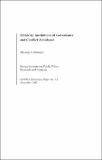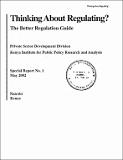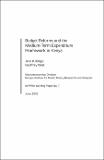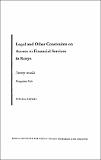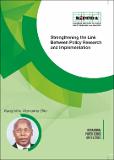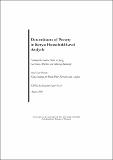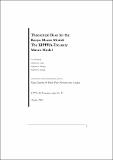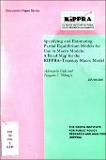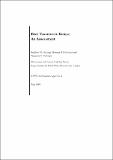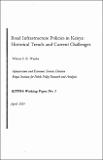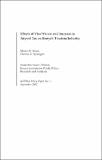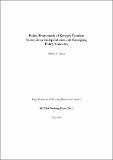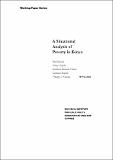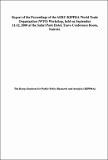3. KIPPRA Research Publications: Recent submissions
Now showing items 681-700 of 709
-
Discussion Paper No. 23 of 2002 on Ethnicity, Institutions of Governance and Conflict Avoidance
(The Kenya Institute for Public Policy Research and Analysis (KIPPRA), 2002)Post-independence Africa has been marked by numerous ethnic conflicts. These conflicts have adversely impacted on the quality of life and have greatly undermined the continent's prospects for development. In addition to ... -
Special Paper No. 01 of 2002 on Thinking About Regulating? The Better Regulation Guide
(The Kenya Institute for Public Policy Research and Analysis (KIPPRA), 2002)Government legislation and regulations, while necessary in any modern society, impose a considerable cost burden on businesses. The regulatory framework of a country affects all businesses in that it imposes costs ... -
Working Paper No. 07 of 2002 on Budget Reforms and the Medium-Term Expenditure Framework in Kenya
(The Kenya Institute for Public Policy Research and Analysis (KIPPRA), 2002)Many developing countries in Africa introduced planning systems after attaining independence but very little attention was given to budget systems as a tool for achieving plan targets. Recent recognition of the need to ... -
Special Paper No. 02 of 2002 on Legal and Other Constraints on Access to Financial Services in Kenya
(The Kenya Institute for Public Policy Research and Analysis (KIPPRA), 2002)This Special Paper examines the constraints that limit access to finance and to develop specific recommendations for the removal of legal constraints and further actions to address problems of non-legal nature. The structure ... -
Policy Brief No. 08 of 2001 on The KIPPRA-Treasury Macro Model: A New Instrument for Policy Analysis and Forecasting
(The Kenya Institute for Public Policy Research and Analysis (KIPPRA), 2001)This brief provides a bird’s-eye view of the KIPPRA-Treasury Macro Model (KTMM) and its importance in policy analysis. KTMM is built mostly along the now fairly standard lines of the aggregate demand aggregate supply ... -
Policy Brief No. 04 of 2001 on Beer Excise Tax in Kenya: An Assessment
(The Kenya Institute for Public Policy Research and Analysis (KIPPRA), 2001)In Kenya, the excise tax on beer contributes a significant share to government revenue. The government is therefore interested in establishing the optimal excise tax rates for the different types of beer: lagers and ... -
Occasional Paper No. 01 of 2001 on Strengthening the Link Between Policy Research and Implementation
(The Kenya Institute for Public Policy Research and Analysis, 2001)The specific purpose of this paper is to identify issues that can strengthen the link between policy research and implementation. This subject matter is the mind of many Africans, and especially in the minds of decision-makers ... -
Occasional Paper No. 02 of 2001 on Effective Private Sector Representation in Policy Formulation and Implementation
(The Kenya Institute for Public Policy Research and Analysis, 2001)This paper highlights some of the key issues concerning the role of interest groups in policy formulation, with particular reference to the private sector. It shows that economic interest groups, as opposed to other groups ... -
Discussion Paper No. 09 of 2001 on Determinants of Poverty in Kenya: Household-Level Analysis
(The Kenya Institute for Public Policy Research and Analysis (KIPPRA), 2001)Strategies aimed at reducing poverty need to identify factors that are strongly associated with poverty and that are amenable to modification by policy. This paper uses household-level data collected in 1994 to examine ... -
Discussion Paper No. 11 of 2001 on Theoretical Base for the Kenya Macro Model: The KIPPRA-Treasury Macro Model
(The Kenya Institute for Public Policy Research and Analysis (KIPPRA), 2001)This paper provides a birds-eye view of the theoretical underpinnings of the KIPPRATreasury macroeconomic model. The model is built mostly along the now fairly standard lines of the aggregate demand–aggregate supply ... -
Discussion Paper No. 08 of 2001 on Specifying and Estimating Partial Equilibrium Models for Use in Macro Models: a Road Map for the KIPPRA-Treasury Macro Model
(The Kenya Institute for Public Policy Research and Analysis, 2001)Formulating research questions and carrying out empirical analysis is not an easy task. It is particularly difficult for practitioners in government ministries, who are bogged down with the day-to-day running of the ministry ... -
Discussion Paper No. 06 of 2001 on Beer Taxation in Kenya: an Assessment
(The Kenya Institute for Public Policy Research and Analysis (KIPPRA), 2001)In Kenya, excise taxes on beer contribute a significant share of government revenue. The government is therefore interested in establishing the optimal excise tax rates for the different types of beer-lager and stout. The ... -
Working Paper No. 04 of 2001 on Education Indicators in Kenya
(The Kenya Institute for Public Policy Research and Analysis (KIPPRA), 2001)This paper looks at the education indicators and their trends, paying special attention to variations across gender and regions. Although Kenya has made an impressive achievement in the development of education since ... -
Working Paper No. 01 of 2001 on Road Infrastructure Policies in Kenya: Historical Trends and Current Challenges
(The Kenya Institute for Public Policy Research and Analysis (KIPPRA), 2001)Development and maintenance of physical infrastructure are prerequisites for economic growth and poverty reduction, as they influence production costs, employment creation, access to markets, and investment. This paper ... -
Working Paper No. 05 of 2001 on Estimation Procedure and Estimated Results of the KIPPRA-Treasury Macro Model
(The Kenya Institute for Public Policy Research and Analysis (KIPPRA), 2001)This Working Paper specifies and estimates the theoretical equations behind the KIPPRA-Treasury Macro Model (KTMM). The review heavily draws on previous macro models of Kenya, such as the Chakrabarti--or the macro economic ... -
Policy Paper No. 02 of 2001 on Policy and Legal Framework for the Coffee Subsector and the Impact of Liberalization in Kenya
(The Kenya Institute for Public Policy Research and Analysis (KIPPRA), 2001)A major concern in liberalizing the coffee trade is the need to harmonize the legal framework with policy reform. In particular, the legal framework must change so the institutions previously involved in controlling ... -
Policy Paper No. 03 of 2001 on Effects of Visa Waiver and Increase in Airport Tax on Kenya's Tourism Industry
(The Kenya Institute for Public Policy Research and Analysis (KIPPRA), 2001)This paper analyses the likely impact of the visa waiver introduced in June 1999 and the increase in airport tax in December 1999 on Kenya’s tourism industry. The visa waiver policy was intended to resuscitate the tourism ... -
Working Paper No. 02 of 2001 on Policy Framework of Kenya's Tourism Sector since Independence and Emerging Policy Concerns.
(The Kenya Institute for Public Policy Research and Analysis (KIPPRA), 2001)Tourism is an important sector in Kenya, being the third largest foreign exchange earner after horticulture and tea. The sector is also a major employer with substantial direct, indirect, and induced employment effects. ... -
Working Paper No. 06 of 2002 on a Situational Analysis of Poverty in Kenya
(The Kenya Institute for Public Policy Research and Analysis (KIPPRA), 2001)Poverty is a major social and economic concern in Kenya. According to the 1997 welfare monitoring survey, more than half of Kenya’s population is poor. The government, together with donors, the private sector, the civil ... -
Conference Proceeding No. 01 of 2000 on Report of the Proceedings of the AERC-KIPPRA World Trade Organization (WTO) Workshop
(The Kenya Institute for Public Policy Research and Analysis, 2000)The Uruguay Round of the multilateral trade negotiations led to the establishment of the World Trade Organization (WTO) in 1994, with the mandate of fostering progressive liberalization of world trade in goods and services. ...

